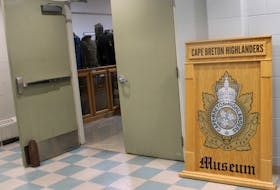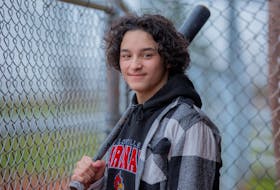From his watchful voter's eye on the provincial election campaign, Cory Chaulk is nervous what future cuts might be looming to education and health — crucial services affecting his family,
Chaulk, who lives in Clarenville, has two young children.
His daughter, Katelyn, 5, is on the autism spectrum and he and his wife, Glenda, also have a three-year-old son, Daniel.
Without the availability of the Dame Moya Greene-led economic recovery team report before the election, Chaulk is worried about how future budgets could affect services that are crucial to his family.
“Cuts in education can affect my son and daughter when they go to school. Health care can really affect my daughter and son,” he said.
“We’re on a fixed income. If there are cuts, we need to know now. We need to make alternate plans for the future.”
Chaulk is left with a lot of questions about how the various parties will handle the province's fiscal crisis, despite what has already been said on the campaign trail.
Chaulk said both his children have advanced skills for their age, but he is concerned about the level of support that will be there for his daughter when she starts school next September.
Announcements around emphasizing computer science studies in schools also had Chaulk worried, since it conflicts with advice he’s getting from experts about limiting screen time, though he said on the other hand computers help his daughter develop language, concentration and other skills.

Support declined
Wanda Martin of St. John’s said she’s frustrated with the existing level of supports for children with special needs, and has been for years.

She said because of pandemic anxiety and her son's transitioning to a junior high from elementary school, she has had to home-school her son, who is on the autism spectrum, since September.
“I've been out of school a long time. … It’s not easy. A lot of stuff I don’t know. But you know what, I will do whatever it takes right now to keep him safe, not only physically but mentally,” she said.
In elementary school, she said, her son had one-on-one support, but when he went to junior high he had to share those supports with several other students.
During the past few elections, she’s had a stock question for all political candidates.
“Actually, every candidate that comes to my door, I always ask them the same thing. ‘What are your views on education and special needs?’” Martin said, adding she has no party loyalty.
“If the Green Party said they would go out and do something, I would probably vote for them, no question.”

Action plan
Paul Walsh, chief executive officer of the Autism Society of Newfoundland and Labrador, said the non-profit group has had a fantastic relationship with the government and also works closely with the Newfoundland and Labrador English School Board. He said he’s pleased with the province’s success implementing the autism action plan.
The association is apolitical and he expects whatever party is elected Feb. 13, the partnership will continue.
“I don’t think any government that would be elected of any colour or any stripe … in this province would turn its back on autism. Nor would they turn their back on heart disease or cancer or anything else,” Walsh said.
Everyone's needs are different.
For example in terms of screen time, Walsh noted the same recommendations for the public apply to a child on the autism spectrum. But each individual, depending on their situation, may be more or less tolerant of the stimulation of screen time.
As for support in schools, he noted there are a group of workers who help students.
But because there are more elementary schools, the number of students needing support in any given junior high or high school classroom may be higher, and therefore resources are shared among more students.
The Canadian average of those diagnosed with autism is one in 66, whereas in Newfoundland and Labrador, that number is higher — one in 57.
@BarbSweetTweets









